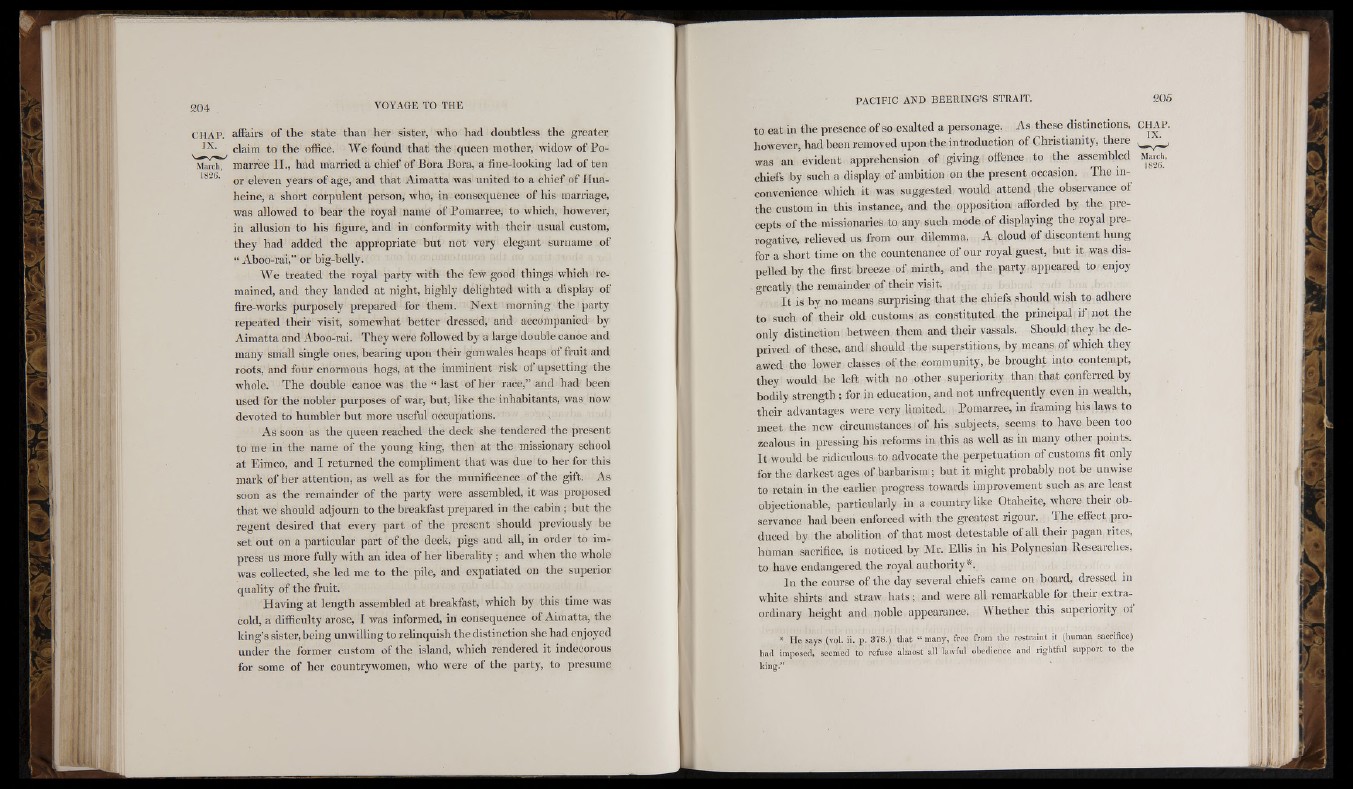
CH AP . affairs of the state than her sister, who had doubtless the greater
claim to the office. YVe found that the queen mother, widow of Po-
March, marree II., had married a chief of Bora Bora, a fine-looking lad of ten
or eleven years of age, and that Aimatta was united to a chief of Iluaheine,
a short corpulent person, who, in consequence of his marriage,
was allowed to bear the royal name of Pomarree, to which, however,
in allusion to his figure, and in conformity with their usual custom,
they had added the appropriate but not very elegant surname of
“ Aboo-rai,” or big-belly.
YY"e treated the royal party with the few good things which remained,
and they landed at night, highly delighted with a display of
fire-works purposely prepared for them. Next morning the party
repeated their visit, somewhat better dressed, and accompanied by
Aimatta and Aboo-rai. They were followed by a large double canoe and
many small single ones, bearing upon their gunwales heaps of fruit and
roots, and four enormous hogs, at the imminent risk of upsetting the
whole. The double canoe was the “ last of her race,” and had been
used for the nobler purposes of war, but, like the inhabitants, was now
devoted to humbler but more useful occupations.
As soon as the queen reached the deck she tendered the present
to me in the name of the young king, then at the missionary school
at Eimeo, and I returned the compliment that was due to her for this
mark of her attention, as well as for the munificence of the gift. As
soon as the remainder of the party were assembled, it was proposed
that we should adjourn to the breakfast prepared in the cabin ; but the
regent desired that every part of the present should previously be
set out on a particular part of the deck, pigs and all, in order to impress
us more fully with an idea of her liberality ; and when the whole
was collected, she led me to the pile, and expatiated on the superior
quality of the fruit.
Having at length assembled at breakfast, which by this time was
cold, a difficulty arose, I was informed, in consequence of Aimatta, the
king’s sister, being unwilling to relinquish the distinction she had enjoyed
under the former custom of the island, w'hich rendered it indecorous
for some of her countryw'omen, who were of the party, to presume
to eat in the presence of so exalted a personage. As these distinctions, C H A P .
however, had been removed upon the introduction of Christianity, there
was an evident apprehension of giving offence to the assembled M»rd.,
chiefs by such a display of ambition on the present occasion. The inconvenience
which it was suggested would attend the observance of
the custom in this instance, and the opposition afforded by the precepts
of the missionaries to any such mode of displaying the royal prerogative,
relieved us from our dilemma. A cloud of discontent hung
for a short time on the countenance of our royal guest, but it w'as dispelled
by the first breeze of mirth, and the party appeared to enjoy
greatly the remainder of their visit.
It is by no means surprising that the chiefs should wish to adhere
to such of their old customs as constituted the principal if not the
only distinction between them and their vassals. Should they be deprived
of these, and should the superstitions, by means of which they
awed the lower classes of the community, be brought into contempt,
they would be left with no other superiority than that conferred by
bodily strength ; for in education, and not unfrequently even in wealth,
their advantages were very limited. Pomarree, in framing his laws to
meet the new circumstances of his subjects, seems to have been too
zealous in pressing his reforms iu this as well as in many other points.
It would be ridiculous to advocate the perpetuation of customs fit only
for the darkest ages of barbarism ; but it might probably not be unwise
to retain in the earlier progress towards improvement such as are least
objectionable, particularly in a country like Otaheite, where their observance
had been enforced with the greatest rigour. The effect produced
by the abolition of that most detestable of all their pagan rites,
human sacrifice, is noticed by Mr. Ellis in his Polynesian llesearclies,
to have endangered the royal authority *.
In the course of the day several chiefs came on board, dressed in
white shirts and straw hats; and w'ere all remarkable for their extraordinary
height and noble appearance. Ylhether this superiority of
• H e says (vol. ii. p. 378.) tliat “ many, free from the restr.aint it (human sacrifice)
h ad imposed, seemed to refuse almost all lawful obedience and rightful su p p o rt to th e
king.”